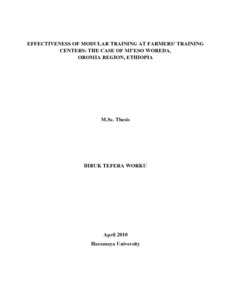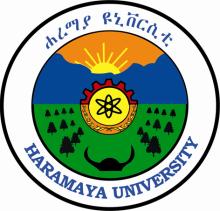Resource information
In order to bring a realistic transformation in Ethiopian agriculture, farmers need to improve their knowledge, skill and attitude & have access to information and technologies, markets etc. Currently, Farmers Training Centres are designed to provide services of extension, trainings, demonstration, information, advice, etc at grassroots level. Modular training is one of the main functions of the centers. In the study area, modular training has been offered since 2007. However, evaluation was not made to determine effectiveness in terms of changes in farmers. knowledge, attitude and practice levels, & relevance to the needs and priorities of rural households to make improvements. On the other hand farmers seem to have been reluctant to participate in the modular training. There is poor communication between research, extension and farmers. Thus, this study focused on effectiveness of the modular training and exploration of institutional and organizational dimensions of Farmers. Training Centers. A multi-stage sampling strategy was used to select sample peasant associations.140 sample households were selected randomly from four peasant associations. Semi-structured interview schedule and checklist were managed to collect both qualitative & quantitative data. Descriptive statistics and tests of significance (chisquare & t-test) were adopted for analysis of quantitative data. Thematic transcriptions, narrations and Rapid Appraisal of Agricultural Knowledge Systems (RAAKS) tools were used for qualitative data analysis. The findings revealed training needs assessment was not conducted in the study area before the training. However, the content of training topics was relevant, need-based & harmonious with the farming practices. The results also demonstrated that, the modular training offered has improved knowledge, attitude and practice levels to enhance performance. Significant differences were observed between mean scores of knowledge, attitude and practice tests of trained and untrained sample households. The technologies included in the trainings were market-oriented and have higher demand. Institutional support service, such as inputs supply, credit, product marketing and cooperatives are poorly functioning. Moreover, poor communication and weak linkages exist between relevant institutions presumed to work with Farmers. Training Centres at local level. Women participation was very low in the modular training. Adaptation and dissemination of improved technologies, fairs, video show, accessing market information for rural households & literacy programme are the positive deviances accomplished in the study area. These are uncommon strategies created by deviant FTCs and help provide better solutions for local challenges. It would contribute better if these positive remarks scaled-out to other similar contexts. In general, governmental & non-governmental organizations should give emphasis to support and strengthen Farmers. Training Centers to sustain effective implementation of the modular training programme.



